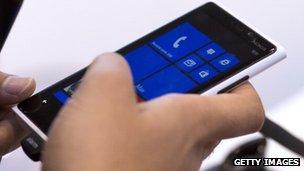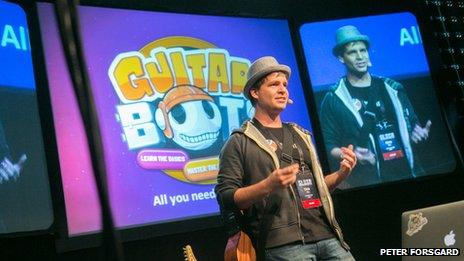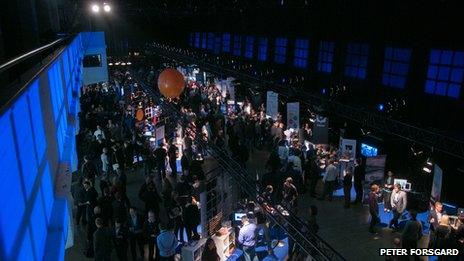Nokia decline sparks Finnish start-up boom
- Published

Slush has become the largest start-up conference in northern Europe
Nokia once dominated the worldwide mobile phone market but its influence has waned against strong competition in the smartphone sector. Finland's largest company has been forced to downsize, with thousands of employees facing redundancy. Is there life beyond Nokia in Finland?
The Slush conference in Helsinki provides a window on Finland's future.
Five hundred companies and 200 investors have come together for the largest start-up conference in northern Europe. And everyone is looking for the next big thing.
Slush was set up five years ago by Peter Vesterbacka, chief marketing officer of Rovio, the maker of video game Angry Birds, and the company's self-proclaimed "mighty eagle".
"Finland has become one of the most dynamic places on the planet for start-ups and for creating new innovations and business," he says.

More than 200 start-ups have been created in Finland by former Nokia staff
"Angry Birds emerged out of the slushy streets of Helsinki - not LA, not Hollywood, not California.
"The future is very much with the start-ups. It's obvious to me that's where the future jobs are coming from. We need to break with the past and look where to invest."
'Strategic change'
In June Nokia announced its latest round of job cuts - 10,000 people will be made unemployed globally. Of those, 3,700 jobs are in Finland, which is around 40% of Nokia's Finnish workforce.
Last April the company began a programme to help highly skilled departing employees set up their own start-ups, offering financial help and training. So far, 220 start-ups have been launched in Finland by former Nokia staff.
One of those at Slush is Jolla Mobile, which unveils its new operating system, Sailfish - created by the team behind the cancelled MeeGo system.
The co-founder and chief executive of Jolla, Marc Dillon, was made redundant last year after spending 10 years working for Nokia in San Diego and Helsinki.
"There was a strategic change and we realised that we had the talent, the ability and the pedigree to go out and create even better products," he says.
Amid a backdrop of piano anthems and a stage full of employees in company T-shirts, Jolla announces that one of Finland's main mobile networks will carry its devices once they launch.
Away from the main stage hundreds of start-ups are pitching their ideas, from a mobile fishing app to a food and fitness service for dogs. They have just two minutes to impress the judges so the pitches are bold.

Ovelin's Chris Thur aiming to repeat last year's pitching event success
"We'll give your health back to you," claims one.
"What you are looking at now will be the most recognisable brand in the world," asserts another.
Finnish start-up Ovelin won last year's pitching event with WildChords, an iPad game that teaches you to play the guitar. The co-founder and chief executive, Chris Thur, has just come offstage after launching the latest product, GuitarBots.
"Right now I'm quite pumped. It's quite an adrenalin rush that you get from this," he tells me with a beaming smile.
Over the past year the original team of four has grown into a company of 12 in Helsinki, with funding now coming in from Silicon Valley.
Nail varnish
The confidence and excitement at Slush is palpable and the Finnish government has been quick to recognise the importance start-ups will have on its future economy.
Incentives - such as tax deductions - are given to venture capitalists investing in small enterprises and for start-ups investing in research and development.
The Finnish Prime Minister, Jyrki Katainen, is at the conference, wearing multicoloured nail varnish.
"This is absolutely the first time my fingers have been painted," Mr Katainen assures me. The Ovelin team painted them to promote their new game.
Mr Katainen recalls the positive impact Nokia has had on Finland's economy. In 2000, it accounted for 4% of the country's GDP but in 2011 it had dropped to 0.5%.
Nokia recently announced plans to sell its global headquarters in neighbouring Espoo to help raise money. It comes as the Chinese telecoms giant Huawei reveals it will set up a new research and development centre in Finland to take advantage of the country's expertise in mobile technology.
The prime minister says he believes Nokia will remain a crucial player both in Finland and abroad.
"But whatever happens to our traditional industries, we need something new. Start-up enterprises are our lifeline of the future and I am sure there will be lots of success stories," he says.

Some 500 companies and 200 investors took part in Slush this year
Success stories are already emerging. Rovio led the way with Angry Birds but Supercell - a tablet gaming company housed in a former Nokia research centre - is fast gaining admirers.
During the Slush conference two Supercell games - Hay Day and Clash of Clans - held the top two spots on America's iPad grossing list.
Miki Kuusi of Start-Up Sauna - a non-profit programme that coaches entrepreneurs before connecting them with investors - likens Nokia to a big tree in a very small forest.
"Now that Nokia is doing worse the ecosystem around it is developing," he says.
"Some people even say that the current downfall of Nokia is the best thing that's happened to this country because it's challenged us to come up with new ways to have a foundation for our welfare."
- Published28 November 2012
- Published18 October 2012
- Published6 September 2012